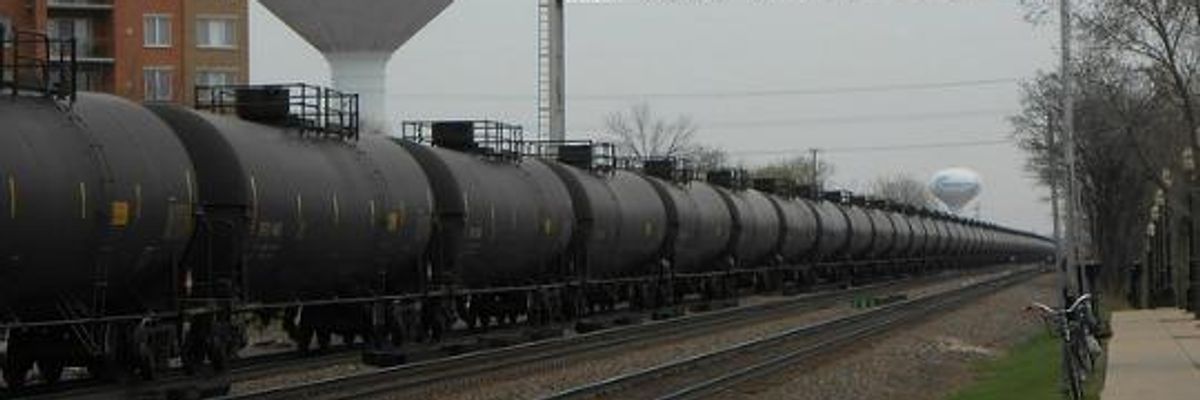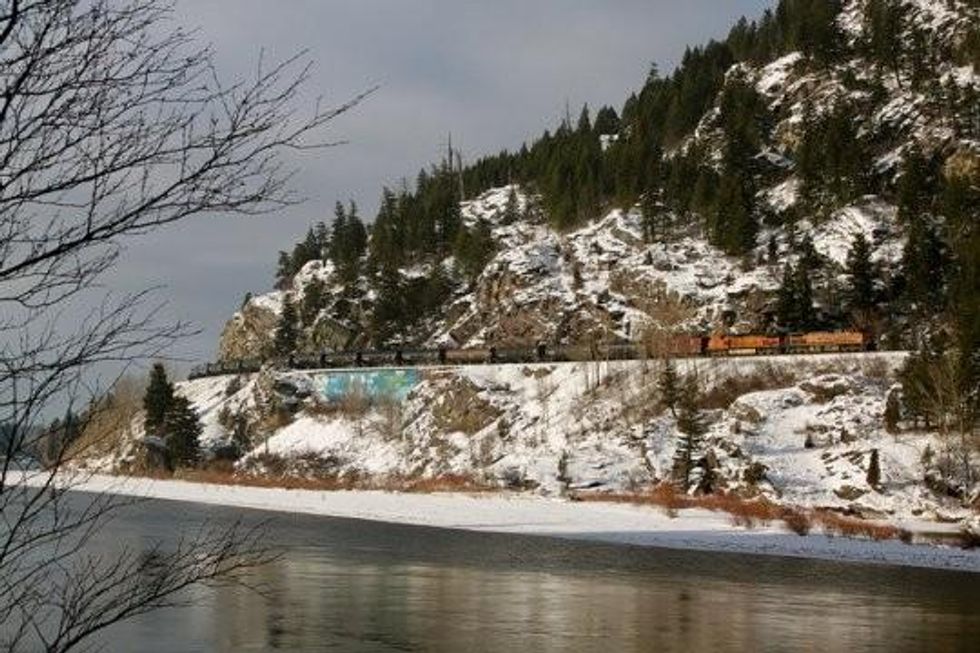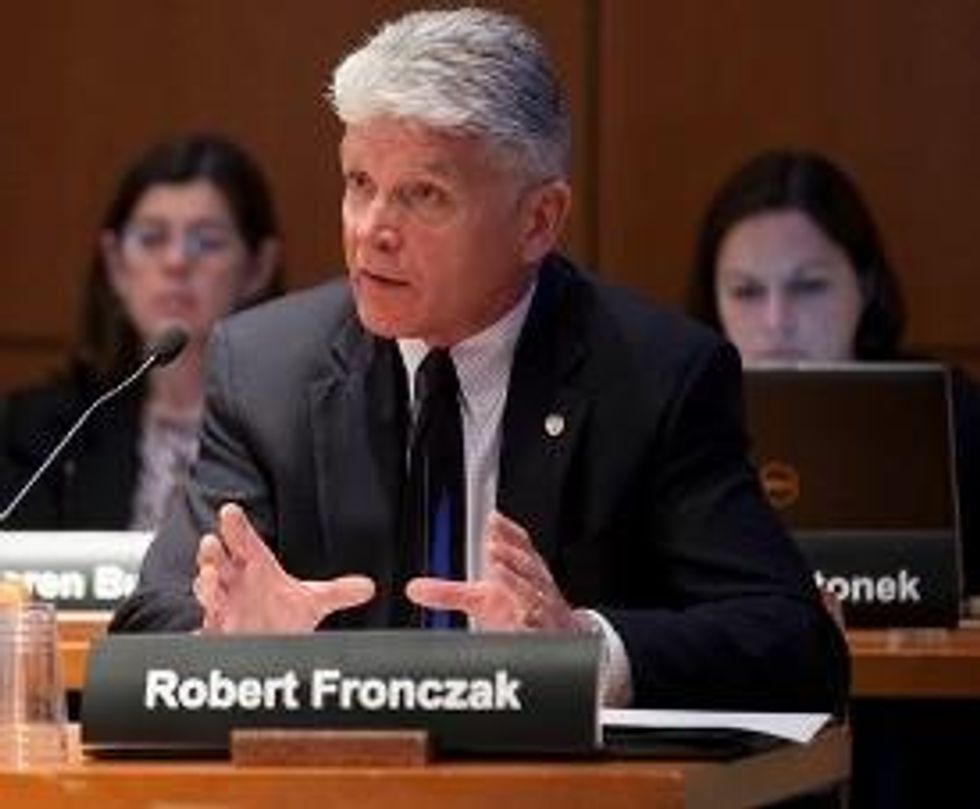
A train carrying crude chugs through a Chicagoland suburb. (Photo: Joshua B./cc/flickr)
To donate by check, phone, or other method, see our More Ways to Give page.

A train carrying crude chugs through a Chicagoland suburb. (Photo: Joshua B./cc/flickr)
Amidst a booming crude-by-rail business, experts warned Tuesday that none of the thousands of train cars rumbling through towns with North Dakota's Bakken crude is safe.
The warning was issued Tuesday during the first of a two-day forum held by the National Transportation Safety Board on the transport of crude oil and ethanol by rail.
The forum follows series of explosive disasters when trains carrying crude oil from the Bakken shale fields of North Dakota derailed, a warning issued by the federal government that this type of crude is "more flammable than traditional heavy crude oil," and an assessment that more crude oil spilled from train accidents in 2013 alone than in the previous four decades combined.
"The Association of American Railroads stated in a 2012 report that crude oil traffic has grown by 443 percent since 2005," outgoing NTSB chairwoman Deborah Hersman said at the forum. "With so much flammable liquid carried by rail, it is incumbent upon the rail industry, shippers, and regulators to ensure that these hazardous materials are being moved safely."
The Star Tribunereported:
The older, general-use tanker cars hauling oil and ethanol meet current government safety standards, but government videos on the first day of a two-day forum about safety in crude oil and ethanol transport showed an older car rupturing during a puncture test, spraying its contents over the test site. [...]
The sturdier tank cars being built now are half as likely as the older model to spill contents in a derailment, the rail industry estimates.
A big part of the risks has to do with the DOT-111, a model of tank car often used to transport the Bakken crude. As Curtis Tate has highlighted in reporting for McClatchy, this type of car been linked to accidents for years, including the Lac Megantic, Quebec deadly catastrophe and the Casselton, North Dakota explosion. The NTSB warned the tank model was inadequate to meet safety risks, saying in a report that their design made them "susceptible to damage and catastrophic loss of hazardous material."
"Did it take body counts and derailments for us to understand that there's an issue?" Hersman asked Tuesday.
Tate reports:
Manufacturers began building cars to a new industry standard, called CPC-1232, later that year. But the production of crude oil in North Dakota's Bakken shale region surged so fast in 2012 and 2013 that tens of thousands of older cars were pressed into service.

Right now, there's no sign of slowdown in the crude being pumped out of the region, and the newer cars can't meet up with the demand.
"There is no question that taking DOT-111s out of the fleet is going to reduce risk," said Robert Fronczak, assistant vice president of environment and hazardous materials for the Association of American Railroads, but noted it was a massive undertaking.
Some manufacturers have moved forward with voluntary upgrades, but even the newer cars pose risks. "The NTSB is not convinced that these modifications offer significant safety improvements," NTSB Vice Chairman Christopher Hart warned last month.

"Those types of commodities could be classified as a flammable gas instead of a flammable liquid which would require (a) pressure car," Fronczak said, adding that it would be "more appropriate" to carry it in pressure cars, like propane is transported, yet it continues to be transported in standard cars.
Reuters reports that
[t]ransportation officials said they were dismayed by testimony that volatile oil-by-rail shipments were moving on the tracks in standard tank cars when a pressurized tank car might be more fitting.
Regulations on a new tank design have yet to be finalized, and until that does, industry officials say they are wary of investing massive capital in retrofits that might not be up to the new standard.
Environmental groups have said the only way to truly prevent the risks posed by this kind of disaster is to leave the oil in the ground.
____________________
Common Dreams is powered by optimists who believe in the power of informed and engaged citizens to ignite and enact change to make the world a better place. We're hundreds of thousands strong, but every single supporter makes the difference. Your contribution supports this bold media model—free, independent, and dedicated to reporting the facts every day. Stand with us in the fight for economic equality, social justice, human rights, and a more sustainable future. As a people-powered nonprofit news outlet, we cover the issues the corporate media never will. Join with us today! |
Amidst a booming crude-by-rail business, experts warned Tuesday that none of the thousands of train cars rumbling through towns with North Dakota's Bakken crude is safe.
The warning was issued Tuesday during the first of a two-day forum held by the National Transportation Safety Board on the transport of crude oil and ethanol by rail.
The forum follows series of explosive disasters when trains carrying crude oil from the Bakken shale fields of North Dakota derailed, a warning issued by the federal government that this type of crude is "more flammable than traditional heavy crude oil," and an assessment that more crude oil spilled from train accidents in 2013 alone than in the previous four decades combined.
"The Association of American Railroads stated in a 2012 report that crude oil traffic has grown by 443 percent since 2005," outgoing NTSB chairwoman Deborah Hersman said at the forum. "With so much flammable liquid carried by rail, it is incumbent upon the rail industry, shippers, and regulators to ensure that these hazardous materials are being moved safely."
The Star Tribunereported:
The older, general-use tanker cars hauling oil and ethanol meet current government safety standards, but government videos on the first day of a two-day forum about safety in crude oil and ethanol transport showed an older car rupturing during a puncture test, spraying its contents over the test site. [...]
The sturdier tank cars being built now are half as likely as the older model to spill contents in a derailment, the rail industry estimates.
A big part of the risks has to do with the DOT-111, a model of tank car often used to transport the Bakken crude. As Curtis Tate has highlighted in reporting for McClatchy, this type of car been linked to accidents for years, including the Lac Megantic, Quebec deadly catastrophe and the Casselton, North Dakota explosion. The NTSB warned the tank model was inadequate to meet safety risks, saying in a report that their design made them "susceptible to damage and catastrophic loss of hazardous material."
"Did it take body counts and derailments for us to understand that there's an issue?" Hersman asked Tuesday.
Tate reports:
Manufacturers began building cars to a new industry standard, called CPC-1232, later that year. But the production of crude oil in North Dakota's Bakken shale region surged so fast in 2012 and 2013 that tens of thousands of older cars were pressed into service.

Right now, there's no sign of slowdown in the crude being pumped out of the region, and the newer cars can't meet up with the demand.
"There is no question that taking DOT-111s out of the fleet is going to reduce risk," said Robert Fronczak, assistant vice president of environment and hazardous materials for the Association of American Railroads, but noted it was a massive undertaking.
Some manufacturers have moved forward with voluntary upgrades, but even the newer cars pose risks. "The NTSB is not convinced that these modifications offer significant safety improvements," NTSB Vice Chairman Christopher Hart warned last month.

"Those types of commodities could be classified as a flammable gas instead of a flammable liquid which would require (a) pressure car," Fronczak said, adding that it would be "more appropriate" to carry it in pressure cars, like propane is transported, yet it continues to be transported in standard cars.
Reuters reports that
[t]ransportation officials said they were dismayed by testimony that volatile oil-by-rail shipments were moving on the tracks in standard tank cars when a pressurized tank car might be more fitting.
Regulations on a new tank design have yet to be finalized, and until that does, industry officials say they are wary of investing massive capital in retrofits that might not be up to the new standard.
Environmental groups have said the only way to truly prevent the risks posed by this kind of disaster is to leave the oil in the ground.
____________________
Amidst a booming crude-by-rail business, experts warned Tuesday that none of the thousands of train cars rumbling through towns with North Dakota's Bakken crude is safe.
The warning was issued Tuesday during the first of a two-day forum held by the National Transportation Safety Board on the transport of crude oil and ethanol by rail.
The forum follows series of explosive disasters when trains carrying crude oil from the Bakken shale fields of North Dakota derailed, a warning issued by the federal government that this type of crude is "more flammable than traditional heavy crude oil," and an assessment that more crude oil spilled from train accidents in 2013 alone than in the previous four decades combined.
"The Association of American Railroads stated in a 2012 report that crude oil traffic has grown by 443 percent since 2005," outgoing NTSB chairwoman Deborah Hersman said at the forum. "With so much flammable liquid carried by rail, it is incumbent upon the rail industry, shippers, and regulators to ensure that these hazardous materials are being moved safely."
The Star Tribunereported:
The older, general-use tanker cars hauling oil and ethanol meet current government safety standards, but government videos on the first day of a two-day forum about safety in crude oil and ethanol transport showed an older car rupturing during a puncture test, spraying its contents over the test site. [...]
The sturdier tank cars being built now are half as likely as the older model to spill contents in a derailment, the rail industry estimates.
A big part of the risks has to do with the DOT-111, a model of tank car often used to transport the Bakken crude. As Curtis Tate has highlighted in reporting for McClatchy, this type of car been linked to accidents for years, including the Lac Megantic, Quebec deadly catastrophe and the Casselton, North Dakota explosion. The NTSB warned the tank model was inadequate to meet safety risks, saying in a report that their design made them "susceptible to damage and catastrophic loss of hazardous material."
"Did it take body counts and derailments for us to understand that there's an issue?" Hersman asked Tuesday.
Tate reports:
Manufacturers began building cars to a new industry standard, called CPC-1232, later that year. But the production of crude oil in North Dakota's Bakken shale region surged so fast in 2012 and 2013 that tens of thousands of older cars were pressed into service.

Right now, there's no sign of slowdown in the crude being pumped out of the region, and the newer cars can't meet up with the demand.
"There is no question that taking DOT-111s out of the fleet is going to reduce risk," said Robert Fronczak, assistant vice president of environment and hazardous materials for the Association of American Railroads, but noted it was a massive undertaking.
Some manufacturers have moved forward with voluntary upgrades, but even the newer cars pose risks. "The NTSB is not convinced that these modifications offer significant safety improvements," NTSB Vice Chairman Christopher Hart warned last month.

"Those types of commodities could be classified as a flammable gas instead of a flammable liquid which would require (a) pressure car," Fronczak said, adding that it would be "more appropriate" to carry it in pressure cars, like propane is transported, yet it continues to be transported in standard cars.
Reuters reports that
[t]ransportation officials said they were dismayed by testimony that volatile oil-by-rail shipments were moving on the tracks in standard tank cars when a pressurized tank car might be more fitting.
Regulations on a new tank design have yet to be finalized, and until that does, industry officials say they are wary of investing massive capital in retrofits that might not be up to the new standard.
Environmental groups have said the only way to truly prevent the risks posed by this kind of disaster is to leave the oil in the ground.
____________________